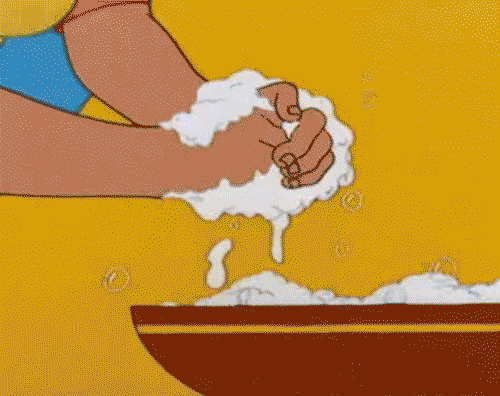8 Basic Personal Hygiene Habits You're Doing Wrong
2014.03.11

Nobody wants to admit that they're covered in filth and bacteria. But as various studies have pointed out, there are certain aspects of your daily personal hygiene routine that might actually be doing more harm then good. Find out what they are:
1. Antibacterial soap messes with your hormones.
This has to do with the chemical called triclosan, which is an ingredient found in about 75 percent of antibacterial soaps, household cleaning products, and even toothpaste! The FDA found that these soaps are no more effective than regular soap at preventing illness, and tests done on animals claim it may actually alter hormone levels.
2. Washing your clothes risks exposing it to E. coli and feces.
Research has found that doing just one load of underwear in the washing machine can transmit 100 million E. coli into the water, which can be transferred over to the next load. That means just a tenth of a gram of poop in the average pair of underwear is all it takes to ruin the whole batch. In order to prevent this, you'll need run the washer at 150 degrees and transfer laundry to the dryer as quickly as possible, since bacteria multiply in damp areas.
3. Not everything stays in the toilet after you flush.
This urban legend was finally confirmed on MythBusters, and proved that flushing open toilets causes fecal matter to fly into the air (and on to your toothbrush). These particles can even float as far as 6 feet away! That's a good enough reason to consider installing an outdoor toilet for your home.
4. Air blowers are not really the best thing.
As reported by various studies, paper towels might be bad for trees, but they're far more hygienic than hand dryers. Much of the benefit comes from how quickly paper towels get your hands dry (15 seconds) compared to air dryers (45 seconds). These towels also take up less energy to make than what is needed to produce the hot air in the dryer.
5. Your contact lenses are harboring bacteria.
This mostly has to do with the 'biofilm' that forms on unclean contact lenses, which is just a fancier way of saying "thin layer of bacteria." Common culprits include rinsing with non-sterile tap water and re-using contact lens solution. The best way to avoid this is to replace the cases often, remove all residue liquid after rinsing, or just stick to wearing glasses.
6. Your mouth retainer is disgusting.
Retainers that aren't cleaned properly have a pretty good chance of fostering harmful microbes. This problem arises when people who keep their retainers in a case barely rinse them with water before popping them back in their mouths at night.
7. Your belly button is filthy.
In this study, one man's belly button was found to be home to bacteria previously known to exist only in the soil of Japan. The researchers also discovered 2,368 unique species of bacteria after swabbing just 60 belly buttons; in which 1,458 of the samples were revealed to be completely new to science. Ew!
8. Your daily shampoo routine is overkill.
One dermatologist at Columbia University found that washing your hair every day can make it oilier, since "you're removing the sebum [natural hair oils]. Then the oil glands compensate by producing more oil." She recommends washing your hair only 2 or 3 times a week. But if you insist on washing your hair every day, stick to shampoos with gentle formulas.
More Articles
Copyright © Fooyoh.com All rights reserved.